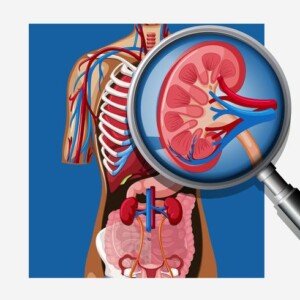Kidney problems seem to go hand-in-hand with chronic heart failure – and that’s because they DO go hand-in-hand with this common but serious condition.
Heart failure can be either acute (sudden) or chronic (longstanding).
Years ago the chronic type was more-so referred to as congestive heart failure.
But because not every patient with the chronic version experiences a congestive process that leads to fluid retention (edema), the word “congestive” has been increasingly replaced with “chronic.”
The Heart Suffers, the Kidneys Suffer
“Kidney disease can sadly be a common complication of heart failure,” says George Ruiz, MD, former chief of cardiology at MedStar Union Memorial and MedStar Good Samaritan Hospitals, with expertise in the care of adults with advanced heart failure, pulmonary hypertension, congenital heart disease and heart disease during pregnancy.
“The kidneys need blood flow to function,” continues Dr. Ruiz.
“As heart failure progresses, the heart may pump increasingly less amounts of blood to the kidneys – this can drive their dysfunction.
“This is further exacerbated by use of chronic diuretics (to manage the excess fluid that comes with heart failure) as well as lower blood pressure (a direct consequence of the heart pumping less blood).
“So, you can understand how the kidneys often find themselves in a tough spot – literally.”
The Kidneys Have a Mind of Their Own
Years of reduced pumping action from the heart will damage the kidneys.
One-fifth of cardiac output gets directed to these small greedy organs that don’t like reductions in blood supply.

Source: vecteezy.com
Chronic heart failure may be associated with a reduced ejection fraction. Ejection fraction is the percentage of blood that’s pumped out with each beat – relative to how much blood is in the heart right before each beat.
Thus, an ejection fraction of 40 percent means that only 40 percent of the pre-beat blood volume is being pumped out or ejected with each beat.
Ejection fraction should be at least 55 percent. Below that is considered heart failure, for which there are varying degrees.
Though 40 percent is a lot closer to the lower end of the normal range than is, say, 20 percent (really, really weak heart), it’s still enough to damage the kidneys over time.
Remember, the kidneys are highly sensitive to reductions in blood flow – though they are also pretty good at compensating for this shortage for a long time.
Blood tests can reveal kidney function. These little organs can be functioning poorly while the patient is not experiencing any symptoms of chronic renal failure.
The kidneys are good fighters and want to keep working hard, despite being stiffed of an optimal blood supply by a failing heart muscle.
“We can’t keep doing this any longer!”
However, for some patients with chronic heart failure – even though their ejection fraction stays the same over several years – the kidneys just one day decide to start giving up the good fight.
Creatinine blood test numbers may or may not be getting higher, but the BUN sure will. This stands for blood urea nitrogen.
The kidneys filter toxins (urea) out of the body, eliminating them through urine. As the kidneys deteriorate, urea builds up in the bloodstream, affecting the entire body.
The patient grows weaker and develops other symptoms such as brain fog, increasing grogginess and suppressed appetite. In a very elderly patient, these symptoms can mimic the natural effects of old age.
This worsening can go on for a while, but what sometimes happens is that literally overnight there’s a much worsened scenario:
The patient is too weak to exit bed, won’t eat, has altered mental status and just wants to sleep.
This abrupt worsening of the clinical picture is obvious and prompts family members to get the patient to the emergency room.
The kidneys are now calling it quits.
They’ve compensated long enough. They are going into acute decompensation – fueled by chronic heart failure – but also the side effects of the diuretic drugs that are taken to combat fluid retention. Old age doesn’t help.
This is end renal failure – secondary to chronic heart failure. This is a common fatal complication of CHF.
Take-home Message
Perhaps the best thing you can do for your kidneys is to take measures to prevent chronic heart failure.
• Stick to a heart-healthy diet.
• Keep your weight at a medically acceptable level.
• Do not smoke. Limit drinking.
• Do scheduled sessions of aerobic exercise and strength training.
• Drink at least six cups of water a day.
 Dr. Ruiz has also treated patients with congenital heart disease and heart disease during pregnancy. From 2006 to 2007 he served as a White House Fellow and was a special assistant to the Secretary of Veteran Affairs.
Dr. Ruiz has also treated patients with congenital heart disease and heart disease during pregnancy. From 2006 to 2007 he served as a White House Fellow and was a special assistant to the Secretary of Veteran Affairs.
 Lorra Garrick is a former personal trainer certified by the American Council on Exercise. At Bally Total Fitness she trained clients of all ages for fat loss, muscle building, fitness and improved health.
Lorra Garrick is a former personal trainer certified by the American Council on Exercise. At Bally Total Fitness she trained clients of all ages for fat loss, muscle building, fitness and improved health.
.









































